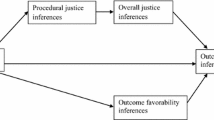Abstract
It was hypothesized that information about others’ expectancies of success (a) is used for predicting their anger or aggression if thwarted and (b) affects the likelihood of thwarting another when retaliation is possible. The Ss controlled a good for which two others had competed and had to choose a single recipient under threat of being shocked by the one not chosen. Differential information about the competitors concerned their need for and/or expectancy of receiving the award. The prediction of shock was a positive function of expectancy level and was far more affected by expectancy than need. The relationship between expectancy level and yielding was obscured by the finding that others’ expectancy levels also affected sentiment toward them.
Similar content being viewed by others
References
BATESON, G. 1941. The frustration-aggression hypothesis and culture Psychological Review, 48, 350–355.
DAVIES, J. C. 1962. Toward a theory of revolution American Sociological Review, 27, 5–18.
FEIERABEND, I. K., & FEIERABEND, R. L. 1966. Aggressive behaviors within polities, 1948-1962: A cross-national study Journal of Conflict Resolution, 10, 249–272.
FINCH, G. 1942. Chimpanzee frustration responses Psychosomatic Medicine, 4, 233–251.
FORD, L. 1963. Reaction to failure as a function of expectancy of success Journal of Abnormal and Social Psychology, 67, 340–348.
GALANTER, E. 1966. Textbook of elementary psychology. San Francisco: Holden-Day.
HEBB, D. O. 1966. A textbook of psychology. Philadelphia: W. B. Saunders.
HOMANS, G. 1961. Social behavior: Its elementary forms. New York: Harcourt, Brace & World.
LEWIN, K., & HOPPE, F. 1930. Untersuchungen zur Handlungs-und affekt psychologie. Ix. Erfolg und Messerfolg Psychologie Forschung, 14, 1–62.
LONGSTRETH, L. E. 1960 Relationship between expectations and frustrations in children Child Development, 31, 667–671.
McGINNIES, E. 1970. Social behavior: A function analysis. Boston: Houghton Mifflin.
MOWER, O. H. 1938. Frustration as an experimental problem: II Some research implications of the frustration concept as related to social and educational problems Character and Personality, 7, 129–135.
MOWER, O. H. 1960. Learning theory and the symbolic processes. New York: Wiley.
PASTORE, N. 1950. A neglected factor in the frustration-aggression hypothesis: A comment Journal of Psychology, 29, 271–279.
PASTORE, N. 1952. The role of abitrariness in the frustration-aggresion hypothesis Journal of Abnormal and Social Psychology, 47, 728–731.
SIEGEL, S. 1956. Nonparametric statistics: For the behavioral sciences. New York: McGraw-Hill.
SKINNER, B. F. 1953. Science and human behavior. New York: Macmillan.
SPECTOR, A. J. 1956. Expectations, fulfillment, and morale Journal of Abnormal and Social Psychology, 52, 51–56.
TINKLEPAUGH, O. 1928. An experimental study of representative factors in monkeys Journal of Comparative Psychology, 8, 197–237.
WILSON, W., WEISS, E. J., & AMSEL, A. 1955. Two tests of the Sheffield hypothesis concerning resistance to extinction, partial reinforcement, and distribution of practice Journal of Experimental Psychology, 50, 51–60.
ZANDER, A. F. 1944. A study of experimental frustration Psychological Monographs, 56 (3, Whole No. 256).
Author information
Authors and Affiliations
Rights and permissions
About this article
Cite this article
Schulman, M. Expectancies as Cues for Predicting the Reaction to Failure. Psychol Rec 22, 267–276 (1972). https://doi.org/10.1007/BF03394091
Published:
Issue Date:
DOI: https://doi.org/10.1007/BF03394091




